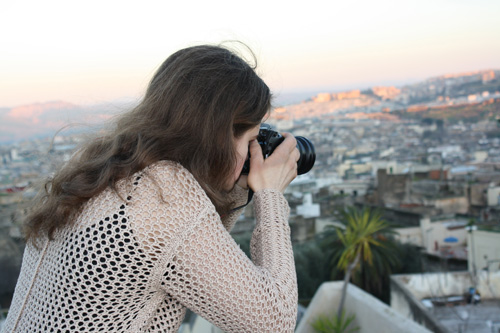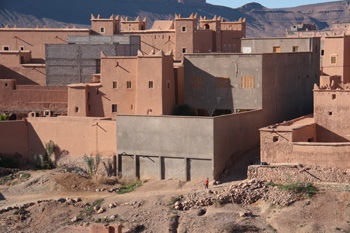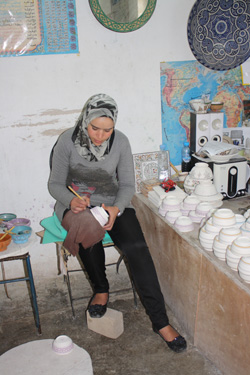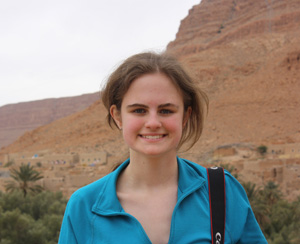Lessons I Learned in Morocco
By Justine Seligson

It was a few weeks before February break. One of my classmates asked me what my plans were. I told him I was going to Morocco.
“Morocco,” he said. “Don’t they have like a lot of bombs there and stuff?”
Hearing this ill-informed comment has become unsurprising to my American ears. Morocco may not technically be in the Middle East. But its Islamic prevalence is enough for some Westerners to consider it to be a land of Muslim extremism, as they do with much of the Middle East—and the religion of Islam itself.
I knew this kid’s attitude was ignorant. I knew that 99% of Muslims did not share the beliefs of Al-Qaeda. However, because Morocco was going to be my first Islamic country to visit, I only became more excited about exploring it firsthand.
My experience in Morocco helped me develop a better understanding of the world’s second largest religion. The true meaning of Islam stresses peace, not violence. One section of the Qur’an actually  states that saving a life is the equivalent to saving everyone’s life. This same idea applies to taking a life. Osama bin Laden’s perspective was a complete distortion. To say all Muslims are like him is like saying that all Christians are like Pat Robertson. It’s stupidity. states that saving a life is the equivalent to saving everyone’s life. This same idea applies to taking a life. Osama bin Laden’s perspective was a complete distortion. To say all Muslims are like him is like saying that all Christians are like Pat Robertson. It’s stupidity.
Another aspect of Muslim life I want to discuss is the role of women. When Westerners think of Islamic women, they conjure up images of repressed, Burqa-wearing child brides. The Moroccan government does not require the wearing of hijabs and burqas (like most Islamic nations). Still, many women choose to wear these coverings simply due to personal beliefs in modesty. Some wear them as great fashion statements. And—with the strong sun in this part of the world—it certainly makes sense to have the sun protection.
But beyond the veil, the Moroccan women have it pretty good when it comes to power in society. Lots of them are extre mely well educated; I met one who was fluent in six languages. Yes. I am aware that in some countries like Afghanistan, many girls are unfortunately denied educational opportunities. I’m just including this to say that is not the case in every Islamic nation. A veil and a belief in Allah do not automatically make a woman a slave. In fact, I would go as a far as to say that female rights in Western and Middle Eastern countries are really the same to some extent. While American women feel pressure to always look stunning and to wear skimpy clothing, Islamic women are assessed more on their character and intelligence. mely well educated; I met one who was fluent in six languages. Yes. I am aware that in some countries like Afghanistan, many girls are unfortunately denied educational opportunities. I’m just including this to say that is not the case in every Islamic nation. A veil and a belief in Allah do not automatically make a woman a slave. In fact, I would go as a far as to say that female rights in Western and Middle Eastern countries are really the same to some extent. While American women feel pressure to always look stunning and to wear skimpy clothing, Islamic women are assessed more on their character and intelligence.
I find it very unsettling that many of us are educated only by the stereotypes. It’s not just people like that classmate, but public officials as well. When there was talk a few years ago about building a Mosque near Ground Zero, it became a huge debate. Newt Gingrich compared this plan to putting a Swastika on the Holocaust Museum. It was a pro-Muslim center, not a pro-terrorism center. The fact that some politicians (the people who are supposed to lead our nation) are unable to differentiate between the two—well that is hard to digest.
That is why I strongly encourage you (especially Americans) to visit an Islamic country like Morocco at some point in your life. Once your plane lands on that nation’s turf, all your post-9/11 generalizations will find themselves in the propeller.
About Justine Seligson: Just-Teens Travel columnist

Justine Seligson is the founder and chief writer of our teen column, Just-Teens Travel. She started the column providing teen insights, ideas and advice for students (and their parents) when she was in 7th grade. She is currently a sophomore at Carleton College in Northfield, Minnesota.
At 14 years old, Justine won the Cynthia Mullins Award in Youth Photography at the Annual Juried Student Exhibition at Silvermine School of Art in New Canaan, CT. She has also been published on National Geographic's Intelligent Travel blog. See her piece here.
|

